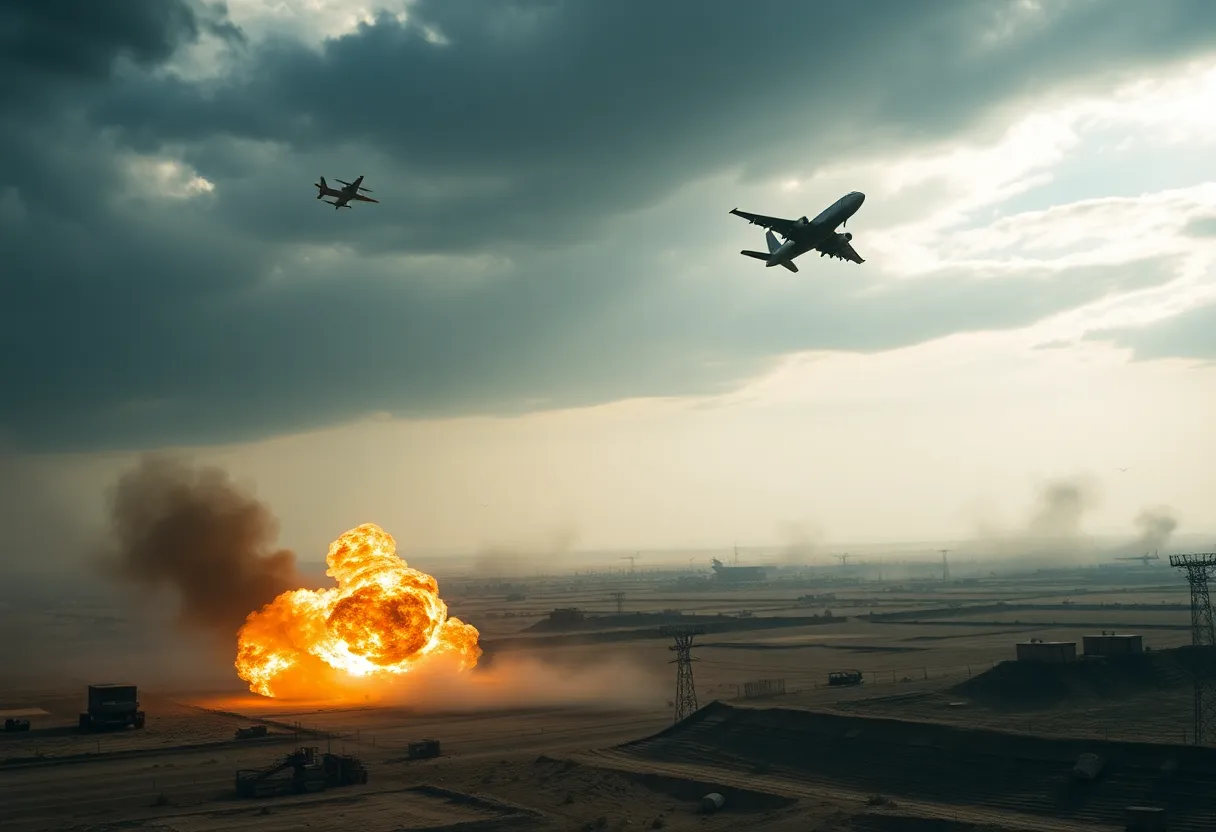News Summary
Tensions surge between Israel and Iran as their conflict escalates following Israel’s strikes targeting Iran’s Quds Force, resulting in significant casualties and a humanitarian crisis. As military actions continue, the situation raises alarms over Iran’s nuclear ambitions and the impacts on regional security. International responses and ongoing military readiness further complicate the context of this urgent and evolving conflict.
Renewed Strikes in the Ongoing Israeli-Iranian Conflict
The tension between Israel and Iran continues to escalate as their conflict stretches into its second week, with no signs of a peaceful resolution in sight. On June 20, 2025, reports emerged that Israel launched strikes targeting Iran’s elite Quds Force, claiming to have killed two of its military commanders. This move heightens the stakes as the region grapples with the ripple effects of military actions.
Targeting Nuclear Ambitions
With an eye on Iran’s nuclear capabilities, Israel directed its military efforts towards the nuclear research facility located in Isfahan. The objective? To disrupt Iran’s nuclear program while preventing the development of nuclear weapons. This action underscores Israel’s long-standing concerns about regional security and the potential fallout from an empowered Iran.
Shifting Strategies
Amidst increasing tensions, Israel reported a change in the nature of Iranian attacks, noting fewer ballistic missile strikes overnight. Instead, Iran has taken a new approach, deploying precision missiles. This tactical shift kept Israeli forces on their toes, especially as Iran successfully launched two drones, managing to breach Israeli defenses for what seems to be a rare occurrence of successful strikes within Israeli territory.
Human Cost of the Conflict
As the situation worsens, the humanitarian impact is becoming increasingly tragic. Since the onset of hostilities on June 13, over 400 lives have been lost in Iran, with a majority being innocent civilians, as reported by the Iranian health ministry. Disturbingly, among these casualties, the toll includes 54 women and children, while over 3,056 individuals have suffered injuries due to Israeli strikes. The plight of civilians continues to be a sobering reminder of the costs associated with armed conflict.
International Perspectives
The unfolding crisis has drawn the attention of global leaders, including Iran’s foreign minister, who traveled to Turkey for talks amid ongoing bombardments. He has raised alarms about the potential dangers of U.S. involvement, while President Trump hinted at a decision regarding U.S. military action in Iran within a two-week timeframe, referring to this as the “maximum” duration he would need to make a call.
Military Readiness and Escalation
In preparation for a longer engagement, the Israeli military has affirmed its readiness for a protracted conflict. Military officials have emphasized that they will continue to pursue specific threats within Iran. So far, Israel has successfully intercepted about 99% of Iranian drones fired at its territory, showcasing a significant defense capability despite some drones managing to penetrate their lines.
Concerns Over Command Continuity
Amid these strikes, former Iranian officials have voiced worries about the continuity of command within Iran’s military forces. This concern arises as attacks aim for key military leaders, potentially undermining Iran’s capacity to respond effectively. Meanwhile, regional analysts speculate that Iran may choose to extend hostilities in an effort to inflict greater damage on Israel.
Diplomatic Efforts Amidst Bombardment
While conflict rages, French President Macron has stepped forward, advocating for dialogue with Iran and emphasizing the importance of ensuring that Iran’s nuclear intentions are peaceful. However, the Iranian foreign minister has made it clear that negotiations under bombardment are not viable, further complicating the diplomatic landscape.
Impacts on Communication and Healthcare
The situation has taken a toll on everyday life in Iran, with internet connectivity facing severe disruptions due to government-imposed restrictions during the conflict. There are hints that this blackout may soon be lifted. Additionally, the devastating strikes have included collateral damage, such as casualties among healthcare personnel, alarming advocates for the protection of medical facilities during warfare.
Emerging Threats and Security Concerns
As U.S. intelligence agencies assess the conflict, new reports indicate that Iran may be on the verge of developing nuclear weapons rather quickly, contradicting earlier evaluations. This prospect raises significant security concerns not only for Israel but for the broader Middle Eastern region and beyond.
In a complex and rapidly evolving situation, the stakes continue to rise as military, humanitarian, and diplomatic fronts all intertwine in the ongoing Israeli-Iranian conflict.
Deeper Dive: News & Info About This Topic
- CNN
- BBC News
- Wall Street Journal
- The New York Times
- NBC News
- Wikipedia: Iran–Israel relations
- Google Search: Israeli-Iranian conflict
- Google Scholar: Israeli-Iranian conflict
- Encyclopedia Britannica: Iran-Israel conflict
- Google News: Israeli-Iranian conflict

Author: STAFF HERE FLORENCE WRITER
The FLORENCE STAFF WRITER represents the experienced team at HEREFlorence.com, your go-to source for actionable local news and information in Florence, Florence County, and beyond. Specializing in "news you can use," we cover essential topics like product reviews for personal and business needs, local business directories, politics, real estate trends, neighborhood insights, and state news affecting the area—with deep expertise drawn from years of dedicated reporting and strong community input, including local press releases and business updates. We deliver top reporting on high-value events such as the Florence Festival of Lights, Pee Dee Pride, and agricultural expos at the Florence Center. Our coverage extends to key organizations like the Florence Regional Chamber of Commerce and the Pee Dee Area Council of Governments, plus leading businesses in healthcare and retail that power the local economy such as McLeod Health and Pee Dee Electric Cooperative. As part of the broader HERE network, including HERECharleston.com, HEREColumbia.com, HEREGreenville.com, and HEREHiltonHead.com, we provide comprehensive, credible insights into South Carolina's dynamic landscape.





